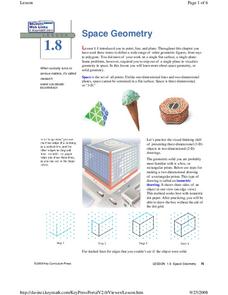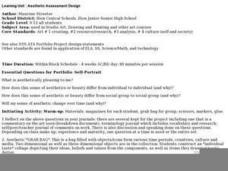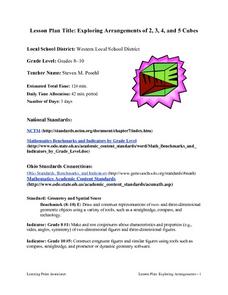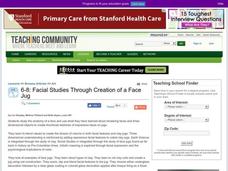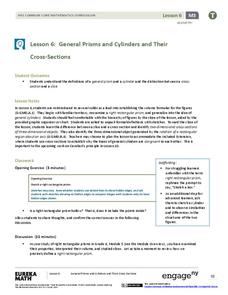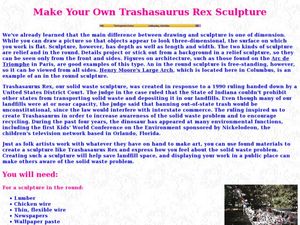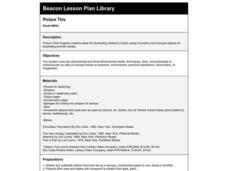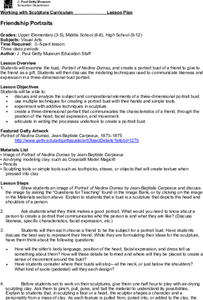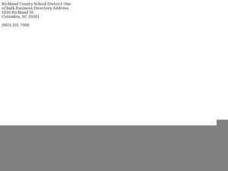Curated OER
Space Geometry
Students explore points, lines and planes as it relates to geometry. In this geometry lesson, students analyze space and explain wy it is 3-D and not flat or 2-D. They solve problems involving volume and 3-D shapes.
Curated OER
Aesthetic Assessment Design
Students examine aesthetic concepts and reflect on them in their journals. They construct individual taste collages from an assortment of two and three-dimensionakl objects.
Curated OER
Exploring Arrangements of 2, 3, 4, and 5 Cubes
Young scholars construct models of various tricubes, tetracubes, and pentacubes that are possible, classify n-cubes into different groupings, and draw these figures on isometric dot paper giving true perspective to what they visualize.
Curated OER
Mathematics Alive: Environment and Design of Human Habitats
Third graders explore the structural composition of buildings and houses. In this math instructional activity, 3rd graders explain how architecture is related to mathematics. They create a blueprint of a structure with at least three...
Curated OER
Quadrilateral Explorations-Grade Nine
Ninth graders investigate quadrilaterals. In this geometry lesson plan, 9th graders examine and classify quadrilaterals using the slope, midpoint and distance formulas. Additionally, students create various quadrilaterals...
Curated OER
Facial Studies Through Creation of a Face Jug
Middle schoolers study facial expressions and create a face jug. In this facial study instructional activity, students look at images of face jugs through history before drawing thumbnails of facial images. They use the coil method to...
EngageNY
General Prisms and Cylinders and Their Cross-Sections
So a cylinder does not have to look like a can? By expanding upon the precise definition of a rectangular prism, the lesson develops the definition of a general cylinder. Scholars continue on to develop a graphical organizer...
Teach Engineering
Connect the Dots: Isometric Drawing and Coded Plans
Individuals discover how to draw cubes on triangle-dot paper. They use cubes to build structures and draw corresponding isometric drawings on dot paper in the second lesson of the series of five. The activity also introduces the concept...
Curated OER
Guess My Shape
Learners play a game with shapes. They work in groups to identify the names and characteristics of various shapes. They give each other clues to see if others can identify the shape being described. This is a great hands on activity.
Curated OER
Make Your Own Trashasaurus Rex Sculpture
Students explore environmental awareness through reusing materials. In this environmental awareness lesson, students use trash to create a "trashasaurus," a large dinosaur sculpture made from waste. Detailed structure and papier-mâché...
Curated OER
Measures of Space I: Lengths and Areas
Pupils discover how to measure in one and two dimensional space and calculate how much space any object of a given dimension occupies. After a discussion about dimensions, students work with Zome System Creator Kits to build one and two...
Curated OER
Foil Fun
Second graders be having hands-on experiences with three-dimensional solid shapes. They investigate the features of solid shapes and examine the names for them. They are introduced to making nets for 3D shapes.
Curated OER
Creating Space
Learners use simple lines and shapes to draw objects, figures, or animals.They explore the process of printmaking and making multiples, use repetition of simple shapes to create complex images, and inquire about a contemporary artist's...
Curated OER
Picture This
Fourth graders use two-dimensional and three-dimensional media, techniques, tools, and processes to communicate an idea or concept based on research, environment, personal experience, observation, or imagination.
Curated OER
Down on the Farm
Learners are introduced to a map of an Illinois farm. They determine whether the map is of the past, present, or future by looking at features on the map. They also use the map to make a three-dimensional model.
Curated OER
Geometric Figures
Students identify two and three dimensional shapes and use appropriate geometric vocabulary to write a description of the figure by taking pictures of geometric figures in their own environment.
Curated OER
The Castle
Students build a castle to Ravi's design using the cubes. Students then make an original model of a solid object from diagrams which show views from the top, front, side and back. Students describe the reflection of rotational symmetry...
Creative Educator
Dream Room Design
Using the Twist™ application, elementary schoolers design their dream room. They follow the prescribed steps to calculate width, length, perimeter, and surface area in order to create a 2-dimensional representation of their dream room...
Curated OER
Friendship Portraits
Students explore sculpture. In this lesson about sculpting, students create a portrait bust. Students choose a classmate to make a bust of and apply all of the necessary elements to their bust. Students will have a better understanding...
Curated OER
Pop-Up Pop Art, Tunnel book
Students study iconic symbols Keith Haring would make in his artwork. They invent a background for the images, and draw the characters. Students create a Tunnel Book and a Pop-Up Book based on their drawings.
Curated OER
Expressive Hands with Stippling Value Shading
Students create a larger than life modified contour drawing of hands in an expressive situation. Hands have linear value, contain a object, and have a patterned background.
Curated OER
Bread Cells
Fifth graders examine plant and animal cells. For this plant and animal cell lesson, 5th graders define what cells are, label their parts, and describe how plant and animal cells are different. They observe cells at a number of web...
Curated OER
Getting to Know You
Students participate in tactile and visual exploration. In this tactile and visual exploration instructional activity, students listen to John Archambault's, Grandmother's Garden, and sing the song, "Friends Are Like Flowers." They...
Pennsylvania Department of Education
Creating Polygons
Students describe, make and compare polygons. For this creating polygons lesson, students identify properties of quadrilaterals and describe common features of two dimensional shapes.
